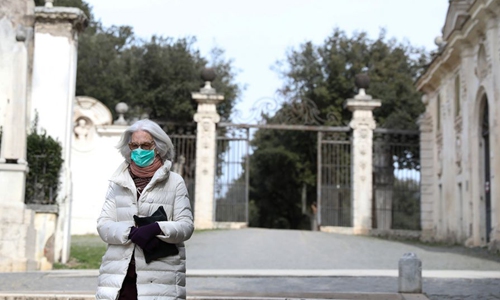HOME >> WORLD
European countries tighten measures to contain COVID-19, brace for economic impact
Source:Xinhua Published: 2020/3/11 8:39:28

A person wearing a mask walks across the Millennium Bridge in London, Britain, on March 9, 2020.(Photo by Tim Ireland/Xinhua)
European countries are tightening their measures to contain the spread of the novel coronavirus, which has infected some 15,000 people across the European continent with about 40 countries reporting cases.
Apart from Italy, the hardest-hit country outside China, France, Germany and Spain have reported more than 1,000 cases.
The rapid increase has forced many European countries to adopt stricter measures, including Italy's unprecedented nationwide lockdown.

A pedestrian wearing a face mask walks on a street in Rome, Italy, March 10, 2020.(Xinhua/Cheng Tingting)
MOVEMENT RESTRICTIONS
On Tuesday, the first day of Italy's nationwide lockdown that will last till April 3, all movements have been restricted across the country except those justified by three reasons: provable work reason, emergency cases, and health needs.
The decree was signed by Italian Prime Minister Giuseppe Conte on Monday night.
"Unfortunately, we have run out of time: the numbers (of the epidemic) tell us that we are having a significant increase in infections, of people hospitalized in intensive and sub-intensive care, and, sadly, also in the number of deaths," Conte explained.
The prime minister clarified that Italy's borders are open but all travelers will be checked at points of entry for signs of fever.
Similar movement restrictions are also being introduced by some other European countries.
Malta stopped all travel to Italy, by air and by sea, after the island country confirmed the fifth case of coronavirus in a teenage daughter of a man who recently traveled for a skiing holiday in Italy.
Serbia, with five confirmed cases of COVID-19, has tightened controls at border crossings, especially at airports. Foreign nationals coming from areas with severe coronavirus transmission will be temporarily banned from entering Serbia, the government decided on Tuesday.
Some countries, such as Portugal and Albania have suspended all flights to and from the most affected areas of Italy.
Spain has also banned all incoming flights from Italy for 14 days as of midnight on Tuesday.
Danish Prime Minister Mette Frederiksen on Tuesday called for the immediate cessation of all air traffic arriving from the red areas (high-risk areas or countries such as northern Italy) landing in Denmark.
Although Austria allows its citizens in Italy to travel home if they agree on two weeks of home quarantine, the alpine country is banning entry of anyone arriving from Italy without a health certificate.
Some airlines are also reducing or cancelling flights due to the impact of the COVID-19.
Finland's national carrier Finnair announced further cuts to capacity on its European routes on Tuesday. Ireland-based Ryanair announced that it will suspend all its flights to, from and within Italy in response to the Italian government's decision to lock down the entire country.
SUSPENSION OF SOCIAL EVENTS
Italy's nationwide lockdown that has affected the life of its some 60 million populations also included the suspension of all cultural, religious, trade and sporting events, including weddings, funerals and the Serie A football championship.
A wide range of public facilities and venues have been affected. It shuts down pubs, movie theaters, museums, places of worship, schools and universities, ski facilities, swimming pools, gyms, and spas.
Italian Prime Minister Conte said that the new measures are also being extended to the educational system, with all schools and universities to be shut down until April 3 rather than March 15 as said in the previous decrees.
The new measures also included that "sporting events and competitions of every level."
Shutdown of schools has also implemented by several other European countries.
Austrian Chancellor Sebastian Kurz announced on Tuesday that all courses at Austrian universities would be canceled for the time being, and the 380,000 or so students should now learn online.
Greece announced the shutdown of all schools and universities across the country for 14 days on Tuesday as the country reported 84 confirmed cases.
The Czech Republic and Moldova made similar decisions on the same day.
A day earlier, Albania has also announced a two-week closure of all schools.
Portuguese authorities are also closing homes, schools, universities, or suspending visits to hospitals and prisons.
Schools in some other European countries, such as Spain, are partially closed depending on the various epidemic situations in different regions.
Public gatherings of different scales are being banned, restricted or not recommended across Europe.
EUROPE BRACES FOR ECONOMIC IMPACT
The fast spread of the virus is expected to take toll on European economy. Many countries have braced for the impact amid economists' warnings.
At a forum organized by the Hungarian Chamber of Commerce and Industry (MKIK), Hungary's Prime Minister Viktor Orban on Tuesday pledged government assistance to economic players which suffer losses due to the novel coronavirus.
"An economic protection action plan is needed," Orban said, adding that he had asked the MKIK to collect feedback from business leaders on the difficulties the different industrial sectors expect to face and the ways to address them.
Orban said that rather than introducing blanket macroeconomic measures, specific sectors, such as tourism, would receive targeted help.
According to the prime minister, Hungary's budgets for 2020 and 2021 will be redrafted to take into consideration the additional billions of euros needed for the measures to stimulate the economy.
On the same day, Danish Finance Minister Nicolai Wammen said at a press conference that the country's business and employees will be offered 125 billion DKK (19 billion US dollars) as part of three-pronged economic initiatives to strengthen the economy from the impact of COVID-19.
The three government initiatives include postponement of the deadline for the payment of value-added tax (VAT), compensation provided by the government for lost revenue and additional expenses to organizers of major events affected by government recommendations based on COVID-19, and the setup of a special unit discussing "targeted and concrete proposals for interim measures" to address current challenges.
Faction leader of Germany's governing conservative union (CDU/CSU) Ralph Brinkhaus also said on Tuesday that German parliament would provide additional budget, up to one billion euros (1.2 billion US dollars), for measures against the new coronavirus.
The funds will be used, among other things, to support research activities, said Brinkhaus.
On Monday, Germany's governing parties of the conservative union and the Social Democratic Party (SPD) had already agreed on various measures to support the economy during the coronavirus epidemic.
Expanding agreed investment paths and enabling new priorities, the coalition committee announced an "investment offensive" with an additional expenditure of 12.4 billion euros until 2024 and is also planning to offer liquidity support to affected German companies.
Posted in: EUROPE